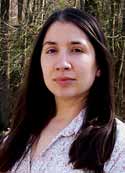My name is Joya and welcome to my little farm.
I run a small, sustainable market garden in Sussex County, Delaware. Here in the center of the Delmarva Peninsula, we are two hours from any major metropolitan area and we are right in the midst of our region’s agricultural center. Chickens, corn and soy are king of the industry here, as are RoundUp ready seeds, crop dusters and CAFOs. For all the rich and productive agricultural land we have relative to our fairly small population, we still need to import the large majority of our food—with the exception of chicken!—from elsewhere in the country. It has always baffled me that even during prime melon season late in the summer, when fragrant, juicy cantaloupe come off the vine like manna from heaven, our supermarkets are stocked with hard and watery-tasting melons shipped in from California, over 3,000 miles away. It just plain doesn’t make sense to me, and so, four growing seasons ago, I decided to do something about it.
Our little farm—called Quite Contrary Gardens after the nursery rhyme, and my own, sometimes contentious personality—started as my experiment in raising food for my own family. I had a background in the horticultural field, and while my professional experience was mainly in the realm of ornamental plants, I had already been growing fresh vegetables on a small scale for years, even when my garden was a few containers on my apartment deck. This property, which is a small parcel that we rent from the family farm, represented the largest growing space I had ever had available. That first year, I cultivated nearly 1000 square feet of vegetable beds with the intent of providing my family with an entire summer’s worth of fresh vegetables. I tried to apply everything I had learned over the years about organic growing and biointensive farming (which I first learned about by following the Dervaes family’s amazing urban micro-farm in Pasadena, California). I soon found myself harvesting far more than my family could eat and I was giving away bags full of tomatoes and squash. That summer, I set up a little roadside stand with an honor-system payment jar—the same kind of stand that dozens of little farms and gardens have around here during the summer. And that’s when our farming business was born.
Every growing season since, we have added to our enterprise. More land has come under cultivation, to the point now that we lease land from the family farm and from one of our neighbors. We added chickens, for eggs at first, but now for pastured broilers that we direct market to our community. We have gone from our little roadside stand to selling this year at two farmers’ markets and to local restaurants. This season, we’ll also be adding a small herd of miniature dairy goats and egg-laying ducks.
My goal, ultimately, is to help build a sustainable, local agricultural system in my region—one that feeds our population rather than the pocketbooks of the giant agribusiness corporations like Perdue. I want to see good farmland developed in a way that builds our soil, enriches our local communities and actually helps to restore the Chesapeake Bay, one of my region’s most precious resources that is dangerously close to ecological collapse, rather than see it developed into townhouses and wasteful exurban housing communities. I think that local food and local farmers are the first step in rebuilding the connections between the people who live in our local communities, making them local citizens rather than citizens of the big box store, corporate, car-culture nation.
To that end, I will be working hard over the next year to reach out to my community. I won’t just be at the farmers’ markets, which are great and wonderful, but not always accessible to all. I’ll be holding classes at the farm on topics ranging from raising a small flock of chickens to growing an herbal medicine cabinet to preserving summer produce for the winter—all useful skills for a sustainable, locally-focused life. I will be attempting to launch an online, regional network of foodies, farmers and citizens interested sustainable agriculture where people can connect, share information and organize events. And, of course, I will be growing good, real, wholesome food on the largest scale I have yet attempted. I hope to share here both my successes and my (hopefully not too frequent) failures, to give a peek into what it takes to start a local, self-sustaining, restorative food system and to provide inspiration, and maybe the occasional cautionary tale, to others who would do the same. Will you join me?
Joya Parsons is the owner and principal operator of Quite Contrary Gardens & Homestead in Sussex County, Delaware. A former IT professional and US Navy veteran, she has spent the last ten years learning the art of organic growing and sustainable living. She is working within her own community to make a local, sustainable food system a reality through education, outreach and example. If she’s not outside getting her hands in the dirt or tending her chickens, she can normally be found with her nose in the latest issue of Mother Earth News.


